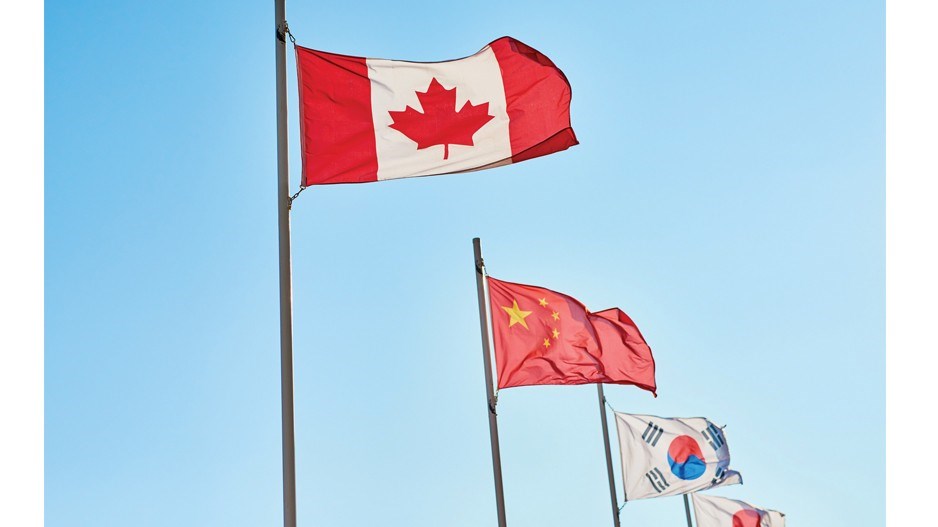Canadians continue to feel positive about its Asia-Pacific neighbours – with one significant exception, an Asia Pacific Foundation of Canada national poll (AFP) has revealed.
Containing the opinions of 3,519 respondents and released on November 25, it shows Canadians’ feelings towards most Asian countries on the positive end of a 1-to-10 scale. Japan, for example, scores a 7.4; South Korea, meanwhile, is at 6.7 and even a more divisive market like India lands on the positive side with a 5.7.
The exception is China.
The country, increasingly defiant of the West in areas ranging from Hong Kong, the Uyghurs in Xinjiang and Huawei 5G networks to the Meng Wanzhou arrest, the detention of Michael Kovrig and Michael Spavor and the origins of COVID-19, now scores only a 3.6 out of 10 in terms of favourability.
China is also one of only two countries to receive a score below 5 out of 10, joining the United States (4.9).
“While China had a relatively effective response to COVID-19, the government has been highly criticized for its handling of the initial outbreak,” the report said. “As a result, 55% of Canadians said that their perceptions of China have worsened due to the pandemic.”
A greater proportion of Canadian respondents (78%) said their perception of the United States had worsened during the pandemic.
This year’s survey also logged some shifts in how Canadians perceive each Asian market’s importance to the economy. On a scale of 1 to 7, Japan (5.1) displaced China (5) as the Asian country identified as most important to the Canadian economy, although China’s score still places it above every other market in Asia. India (4.7) and South Korea (4.5) also place high on the list and remain on an upward trend.
The results are not difficult to interpret, said APF President and CEO Stewart Beck in a statement.
“Given the current global geopolitical climate and the devastating impacts of the pandemic, it is perhaps not surprising to find Canadians’ perceptions of China and the United States at historic lows.” But he added that Canadians remain acutely aware of each market’s economic importance.
“[Canadians] are keen for their governments to explore new partnerships, engage more vigorously in multilateralism and areas of mutual benefit like public health, climate change, and cybersecurity, and to encourage investment from Asia that would benefit this country.”
The poll numbers also show an increasing ideological shift in Canadians’ thinking when it comes to foreign policy. According to the report, 56% of those surveyed said Canada’s top trade and foreign-policy priority should be to align with “like-minded democracies” like the European Union, Great Britain, Australia, Japan and South Korea.
As many as 83% of respondents felt Canada should stand up to China for what’s defined as Canadian national values such as rule of law, human rights and democracy.
“Canadians clearly hold the view that Canada must move forward in Asia, but in a way that upholds our core values, respects human rights and sustainability, and provides economic benefits to all Canadians,” Beck said.
That thinking also extends to support for potential free-trade partners, where the Association of Southeast Asian Nations scored the highest with 68% support, followed by India (63%). A free-trade agreement with China was supported by only 33% of the respondents – falling 26 percentage points from 2018 numbers.
Furthermore, Canadians’ perception of India’s growing economic power “contrasts sharply” with what they think about China’s growing economic power, the report said. For example, 72% agreed that India’s rising economic power is more opportunity than threat, while only 35% thought the same about China’s economic rise.
The same applied as well to views on foreign direct investment (FDI). The poll showed, for example, strong support for FDI in the technology sector from Japan (72%) and South Korea (62%), but not for tech investment from China (30%).
In non-renewable resources, where support for FDI is much lower, no Asian country scored a favourability above 50%, with Japan topping out at 44% while China scored only 19%.
There are some provincial discrepancies on the FDI front, however. Atlantic Canada (54%) and Ontario (52%) were most supportive of Asian investment in Canada, while Quebec, Saskatchewan and Manitoba scored a low 41%. Support in B.C. was slightly higher at 45%.
On whether there should be government incentives to encourage Canadian companies to set up in Asia, B.C. (40%) had the second-lowest level of support, ahead of only Manitoba and Saskatchewan (both 37%). Atlantic Canada again led the way with 47% support.
The full report can be read at www.asiapacific.ca/publication/2020-national-opinion-poll-canadian-views-asia. •




